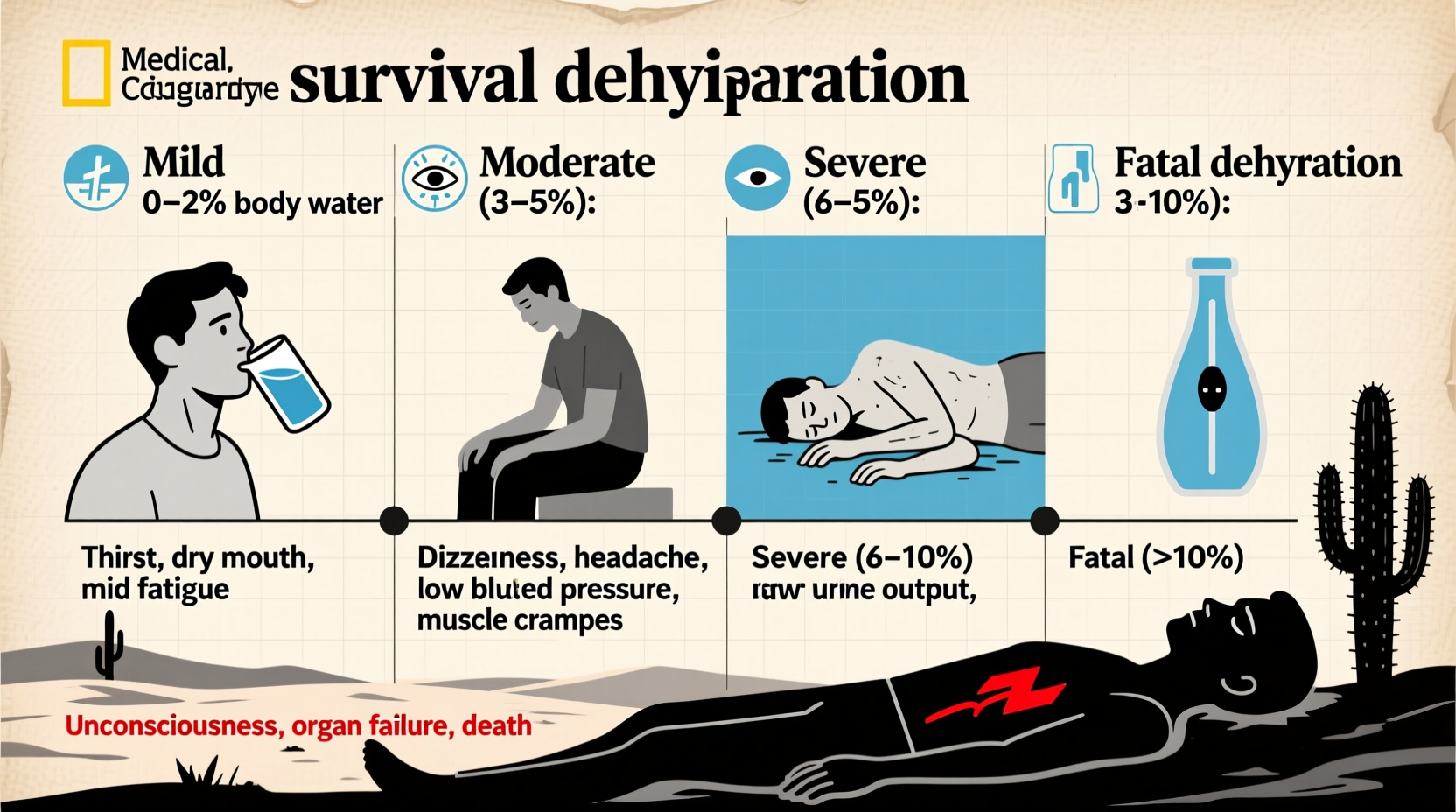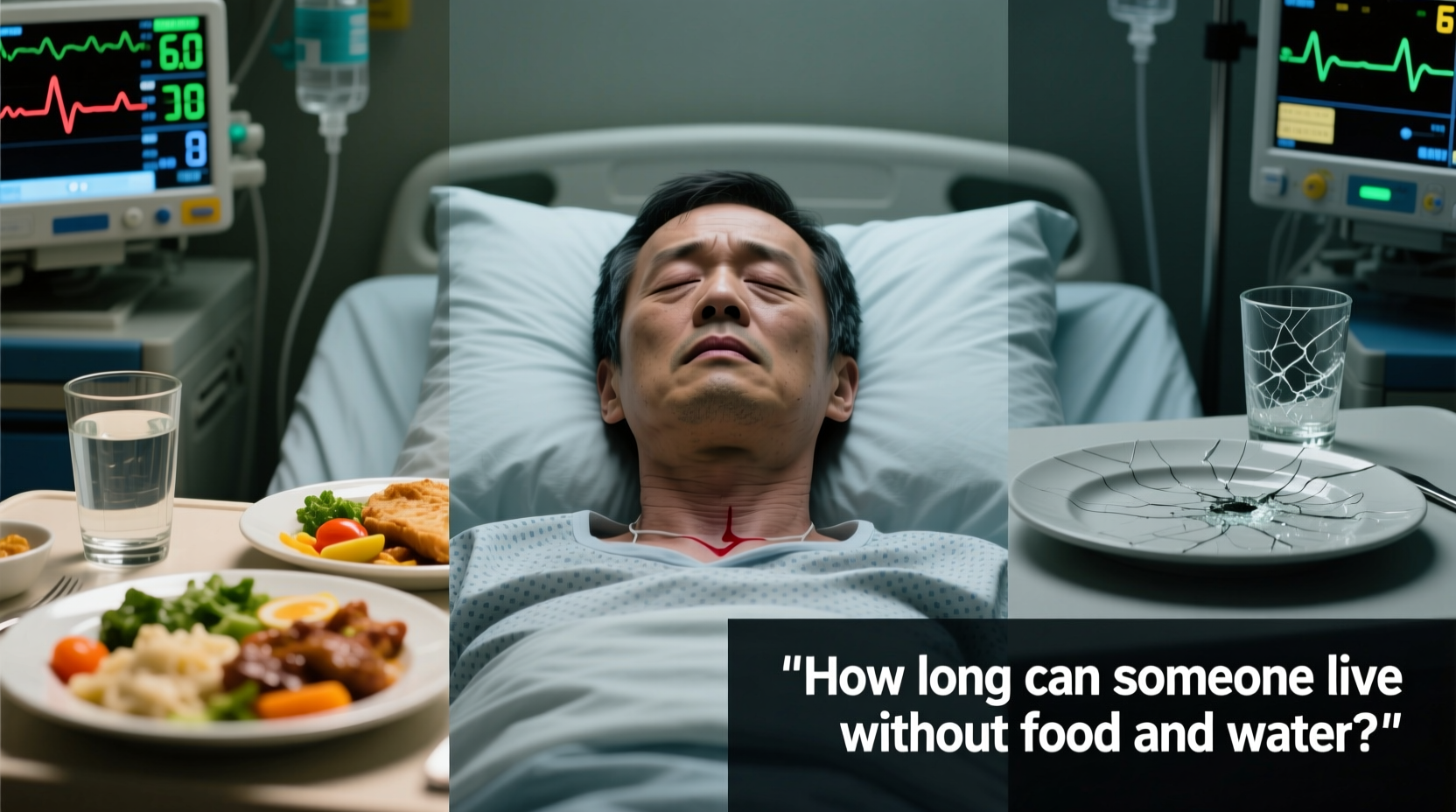Humans can typically survive approximately 3-4 days without water and 30-40 days without food, though these timelines vary significantly based on environmental conditions, individual health factors, and activity levels. Water deprivation becomes life-threatening much faster than food deprivation due to the body's critical need for hydration in essential physiological processes.
The Critical Difference Between Water and Food Deprivation
Understanding human survival limits requires recognizing why water is far more critical than food. While your body can adapt to the absence of calories by metabolizing stored fat and muscle, it cannot function without adequate hydration. Water constitutes about 60% of your body weight and is essential for every major physiological process—from regulating temperature to transporting nutrients and removing waste.
Medical research from the Mayo Clinic confirms that dehydration affects cognitive function within hours and can cause organ failure within days. In contrast, the body enters ketosis after 24-48 hours without food, gradually shifting to fat metabolism that can sustain basic functions for weeks under ideal conditions.
Key Factors That Determine Survival Time
Your actual survival window depends on multiple variables working in combination. These factors create significant variations in how long someone can live without food and water:
- Environmental temperature - Extreme heat accelerates dehydration, while cold temperatures increase caloric needs
- Physical activity level - Movement increases both water and energy expenditure
- Initial health status - Pre-existing conditions like diabetes affect fluid balance
- Body composition - Higher body fat provides more energy reserves during starvation
- Acclimatization - People adapted to arid environments may conserve water more efficiently
| Survival Factor | Impact on Water Deprivation | Impact on Food Deprivation |
|---|---|---|
| High Temperature (90°F/32°C+) | Reduces survival time to 1-2 days | Increases caloric needs by 15-20% |
| Physical Activity | Decreases survival time by 50% or more | Depletes energy reserves 3-5x faster |
| Body Fat Percentage | Minimal direct impact | Each 10% body fat extends survival by 5-7 days |
| Age (Over 65) | Reduces survival time by 25-40% | Decreases survival time by 10-15% |
Hour-by-Hour: The Dehydration Timeline
Dehydration progresses through distinct stages with increasingly severe consequences. According to research published in the CDC's Extreme Heat Guidelines, here's what happens to your body:
- 12-24 hours: Mild dehydration begins with thirst, dry mouth, and reduced urine output. Cognitive function declines by 5-10%.
- 24-48 hours: Moderate dehydration causes dizziness, headache, and significant fatigue. Urine becomes dark yellow.
- 48-72 hours: Severe dehydration leads to rapid heartbeat, confusion, and minimal urine production. Organ function begins to deteriorate.
- 72+ hours: Critical dehydration causes kidney failure, seizures, and eventually coma. Without intervention, death typically occurs within 3-4 days.

Day-by-Day: The Starvation Process
Without food, your body undergoes a carefully regulated metabolic shift. The National Institutes of Health explains this progression:
- Day 1-3: Glycogen stores provide energy. Blood sugar remains stable as the body shifts to ketosis.
- Day 4-7: Ketosis becomes primary energy source. Fat metabolism increases, preserving muscle mass.
- Week 2-3: Protein breakdown increases as fat stores diminish. Muscle wasting becomes noticeable.
- Week 4-6: Organ function declines as essential protein reserves are depleted. Cardiac complications become likely.
- Week 6+: Critical organ failure occurs. Without intervention, death typically happens between 45-60 days.
Documented Survival Cases and Medical Evidence
Real-world cases demonstrate the extreme variability in human survival capacity. The New England Journal of Medicine documented a medically supervised fast where a 27-year-old man survived 382 days without food (with vitamin supplementation and medical monitoring).
Conversely, cases of accidental water deprivation show much less variation. A study in the American Journal of Physiology analyzed survival in desert environments, finding that healthy adults typically succumbed to dehydration within 72 hours when temperatures exceeded 100°F (38°C).
Practical Guidance for Emergency Situations
If facing potential food or water deprivation, these evidence-based strategies can extend your survival window:
- Conserve energy - Minimize movement to reduce water and caloric expenditure
- Seek shade - Reduce exposure to direct sunlight to decrease fluid loss
- Monitor urine color - Pale yellow indicates adequate hydration; dark yellow signals dehydration
- Conserve existing fluids - Avoid salty foods that increase thirst
- Recognize critical symptoms - Confusion, rapid pulse, and inability to produce urine require immediate medical attention
Remember that individual survival capacity varies dramatically. What works for one person might not work for another based on their specific health conditions and environmental factors. Always seek professional medical help when possible rather than testing survival limits.
Frequently Asked Questions
How long can a person survive without water in hot weather?
In temperatures above 90°F (32°C), survival time without water drops significantly to 1-2 days due to accelerated fluid loss through sweating. Extreme heat (100°F/38°C+) can reduce survival time to less than 24 hours for vulnerable individuals.
Can you survive longer without food than without water?
Yes, humans typically survive 30-40 days without food compared to just 3-4 days without water. This is because the body has substantial energy reserves in fat stores, but has limited capacity to conserve water once dehydration begins.
What are the first signs of severe dehydration?
Early signs include extreme thirst, dry mouth, and reduced urine output. As dehydration progresses, symptoms become more severe: dark yellow urine, dizziness, rapid heartbeat, confusion, and eventually loss of consciousness. Severe dehydration requires immediate medical attention.
Does body weight affect survival time without food?
Yes, body composition significantly impacts starvation survival. Each 10% increase in body fat percentage typically extends survival time by 5-7 days, as fat stores provide energy during starvation. However, this relationship doesn't apply to water deprivation, where body weight has minimal impact.











 浙公网安备
33010002000092号
浙公网安备
33010002000092号 浙B2-20120091-4
浙B2-20120091-4